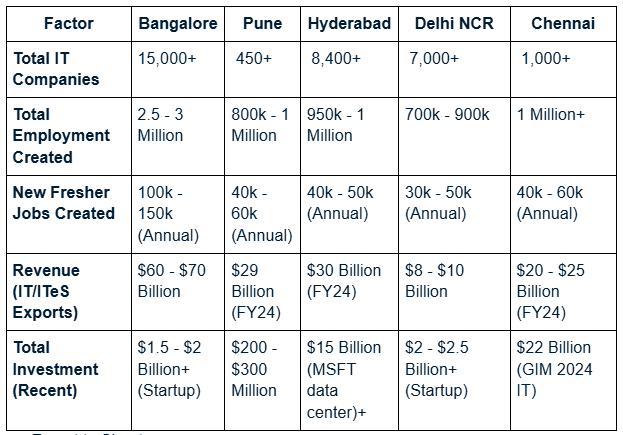Is Bengaluru Really Losing Its Tech Edge? Lets check What Data says
- Nikhilkumar
- May 30, 2025
- 5 min read
Updated: Jun 10, 2025

Bengaluru—colloquially dubbed India’s “Silicon Valley”—has long been the beating heart of the country's technology and innovation landscape. With a heritage of engineering excellence, a rich startup culture, and a population steeped in science, software, and R&D, the city has carved a niche on the global tech map.
Yet, with rising urban challenges, shifting investment climates, and growing competition from other Indian states like Telangana, Tamil Nadu, and Maharashtra, a provocative question is gaining ground: Is Bengaluru losing its tech edge?
Let’s delve into the facts, policies, numbers, and perspectives to answer this.
Investments: A Story of Resurgence, Not Decline
Over the last five years, Karnataka has witnessed an exponential rise in total investments:
In 2018–19, total investments stood at ₹16,500 crore.
By 2022–23, they had skyrocketed to ₹3.23 lakh crore.
From FY19 to FY23, Karnataka secured ₹4.67 lakh crore in total tech and industrial investments.
In the last two years, Bengaluru has witnessed the establishment of 1,926 new startups, pushing the total to 5,062 since 2020, as reported by Bangalore Mirror. This surge reflects Karnataka’s thriving innovation ecosystem, further highlighted by an 18.2% growth in startup registrations between 2022 and 2023, according to The Hindu. While early-stage funding dipped 14% in Q1 2025 to $57.3 million, Bengaluru’s tech backbone remains strong. With $53 billion in IT exports in FY21 and projected industry growth to $350 billion by FY26, the city continues to lead India’s digital economy.
This represents not just a steep upward curve but a testament to investor confidence in the state's potential, much of which remains concentrated in Bengaluru.
Further amplifying this sentiment is the continued inflow of venture capital. Bengaluru accounted for 140 VC deals worth $3.3 billion in 2024 alone, according to Tracxn. Notably, 34 of these were in artificial intelligence, a sector crucial to the next phase of technological evolution.
Startups: A Growing Ecosystem in Spite of Challenges
Despite reports of funding slowdowns, Bengaluru remains a hotbed for startup activity.
In the past two years alone, 1,926 new startups were launched in the city.
Since 2020, the total number of startups founded in Bengaluru has reached 5,062.
Across Karnataka, startup formation grew by 18.2% from 2022 to 2023, according to The Hindu.
Yes, seed-stage funding did fall by 14% in Q1 2025 compared to the previous quarter ($57.3M vs $66.6M), but this decline reflects a global funding correction rather than a localized weakness. Bengaluru remains the preferred launchpad for entrepreneurs across sectors like fintech, edtech, biotech, and deep tech.

Government Policies: Building a Stronger Future
A significant reason Bengaluru continues to draw investment is the Karnataka government’s proactive stance on tech-enabled growth. Several flagship initiatives are laying the foundation for the next wave of innovation.
1. SWIFT City: A New Tech Nucleus
The government has launched an ambitious project titled SWIFT City (Startups, Workspaces, Innovation, Finance, and Technology) in Sarjapura. Planned over 1,000 acres, SWIFT City is poised to become a dedicated tech and innovation corridor.
It is envisioned to combine commercial spaces, research parks, startup accelerators, and green infrastructure. In effect, it could serve as a new-age Electronic City, taking pressure off central Bengaluru and enabling planned innovation-driven urbanization.
2. Draft Space Technology Policy 2024–2029
To secure a pole position in India’s nascent but booming space economy, Karnataka has introduced a draft space tech policy. The plan aims to attract $3 billion in investments over five years, focusing on satellite development, launch systems, and ancillary services.
With the Indian Space Research Organisation (ISRO) headquartered in Bengaluru and several private aerospace firms already operating here, the policy aims to anchor Bengaluru as the capital of India's commercial space sector.
3. Elevate 2024 & Fund-of-Funds for Startups
The Elevate program—already in place for several years—is being ramped up in 2024. The scheme offers grants up to ₹50 lakhs for startups, along with incubation support, mentoring, and venture facilitation.
In parallel, Karnataka has operationalized a Fund-of-Funds mechanism, designed to channel public and private capital into early and mid-stage startups. This helps insulate founders from market volatility and gives them the runway to focus on product and market growth.
4. Semiconductor Manufacturing Push
Karnataka has emerged as a frontrunner in India’s chip manufacturing push, with the Cabinet recently approving incentive packages for Applied Materials, Lam Research, and Bharat Semi Systems.
These proposals involve setting up fab and assembly units in and around Bengaluru, transforming the city from a software hub to a design and hardware manufacturing nucleus.
Industrial Investment: A Multisector Boom
1. Aerospace and Defense
Boeing India Engineering and Technology Center
In 2024, Boeing inaugurated a 1,600-crore engineering and technology center in Bengaluru. This facility will house aircraft design, testing, and simulation teams, giving the city a new identity in global aerospace R&D.
Tata-Airbus Helicopter Assembly Facility
Tata Advanced Systems and Airbus are building India’s first helicopter final assembly line in Kolar, near Bengaluru. The focus will be on the H125 model, and this facility marks a pivotal shift towards full-spectrum aircraft manufacturing in India.
Airbus A220 Aircraft Door Manufacturing
Airbus also awarded a contract to Dynamatic Technologies in Bengaluru to manufacture and assemble doors for the A220 Family aircraft. This strengthens the city’s role in the global aerospace supply chain and aligns with the central government’s ‘Make in India’ and defense indigenization goals.
Talent: India’s Deepest Tech Workforce
According to CBRE, Bengaluru has officially crossed the one-million mark in technology professionals, making it not just India’s but one of the world’s largest tech labor markets.
The city is now among the top 12 global tech hubs, rubbing shoulders with San Francisco, London, Berlin, and Tel Aviv.
Several factors sustain this advantage:
Proximity to top-tier technical institutions like IISc, IIIT-B, RVCE, and BMS College of Engineering.
Continuous reskilling and upskilling programs led by private firms and edtech startups.
Affordable (relatively) cost of living and cultural openness to innovation.
Infrastructure: Addressing Bottlenecks Proactively
1. Namma Metro Expansion
The Phase 2 and 3A expansions of the Namma Metro project are under active consideration by the central government. These phases will connect critical tech corridors like Whitefield, Electronic City, and Hebbal, reducing commute times and improving ease of doing business.
2. Proposed Bengaluru Tunnel Roads
Deputy Chief Minister D.K. Shivakumar recently confirmed that tenders would be floated soon for tunnel road projects aimed at decongesting city traffic. Such infrastructure will be crucial in retaining tech talent and ensuring productivity.
Challenges That Cannot Be Ignored
No analysis would be complete without acknowledging Bengaluru’s pressing problems:
Traffic congestion, with commute times often exceeding 90 minutes.
Aging civic infrastructure, leading to flooding and waste management issues.
Competition from cities like Hyderabad, which are offering more aggressive tax breaks, land policies, and central funding.
These issues, however, are not terminal. What matters is the government’s acknowledgment of them and the steps taken—from metro expansions to dedicated tech corridors—to address them.
The Bigger Picture: Evolution, Not Decline
The narrative that Bengaluru is “losing its edge” often stems from frustration with visible urban issues or cyclical startup trends. But when viewed holistically—considering investment inflows, workforce development, policy direction, and industrial transformation—Bengaluru is clearly transitioning, not tumbling.
The city is moving from being a pure-play software exporter to a full-spectrum innovation hub encompassing aerospace, semiconductors, space, AI, and advanced manufacturing.
Conclusion: A City Reinventing Itself
Far from losing its tech edge, Bengaluru is redefining what it means to be a tech capital. It's becoming a diversified, deep-tech-driven ecosystem supported by strategic government planning, resilient private sector investment, and unmatched talent.
Challenges remain, but the foundations being laid today—from SWIFT City to space tech corridors—will determine the city’s future not just for the next five years, but for decades.
If Bengaluru was the past and present of India’s tech story, it is now working hard to also be its future.







